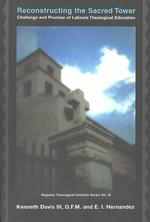 In the early 1990s, pleas for the reformation of theological education began to be heard. The Association of Theological Schools (ATS) responded by drafting new standards in a process of "redevelopment" to move the sector toward a preferred future. That was more than a decade ago, and societal realities have only become harsher and ethnic diversity greater during the intervening years. The Hispanic population in the U.S. and the Hispanic church have doubled and quadrupled respectively, and the demand for trained leadership for these churches is great. Yet Hispanics represent a miniscule 3.5 percent of the student body in ATS seminaries.
In the early 1990s, pleas for the reformation of theological education began to be heard. The Association of Theological Schools (ATS) responded by drafting new standards in a process of "redevelopment" to move the sector toward a preferred future. That was more than a decade ago, and societal realities have only become harsher and ethnic diversity greater during the intervening years. The Hispanic population in the U.S. and the Hispanic church have doubled and quadrupled respectively, and the demand for trained leadership for these churches is great. Yet Hispanics represent a miniscule 3.5 percent of the student body in ATS seminaries.
In short, the Hispanic faith community is still waiting for the demonstration of the "redevelopment" of the ATS educational philosophy by the member institutions.
The book, Reconstructing the Sacred Tower: Challenge and Promise of Latino/a Theological Education, by Kenneth Davis, O.F.M., and Edwin Hernández, states the situation eloquently. (Davis is an associate professor of pastoral theology at Saint Meinrad (Indiana) School of Theology and directs the school's Program for the Formation in Hispanic Ministry. Hernández is the director of the University of Notre Dame's Center for the Study of Latino Education.) The authors spell out in riveting detail the primary issues in training leaders for the new demographic and theological reality in the Hispanic community.
Although ATS and the authors of Reconstructing the Sacred Tower share a similar vision for academic reform and for a future that is more inclusive, it is ironic that most seminaries fail to understand the emerging Hispanic church. Seminary communities are skilled at exegeting the message but less so at exegeting the culture.
Reconstructing the Sacred Tower is written in language that is easy for educators and board leaders to understand. It is written for those who have "ears to hear and eyes to see." Further, it is directed toward those with the will to change and accept the challenge and promise that the Hispanic church brings to this nation. I only wish the study would have contained more on the premise and process of the theological education endeavor.
For example, the book does not address the fact that the gaps in theological education will continue until more support is provided to Bible institutes and church-related colleges and universities, where the majority of Hispanic pre-ministry students are enrolled, or until the SAT scores of Hispanic students climb by 150 points, or the present 8 percent of Hispanic college students is increased, or until the college and high school 28 percent dropout rate is reduced. Churches, the most permanent and hopeful presence in the barrios, must join in this endeavor.
Reconstructing the Sacred Tower challenges leaders in theological education to consider where we go from here and what the future holds for the Christian church with a teeming Hispanic membership. The development and destiny of Hispanic leadership is at stake. Will Hispanic leaders simply be tolerated within theological education, shunted to the sideline through educational segregation and treated as second-class members of the body of Christ? Or will the contributions of Hispanic leaders be appreciated and fully developed to provide "well-trained, broadly prepared, insightful, and committed Latino/a religious leaders who will help sustain their communities" and fulfill the preferred future? By heeding and acting upon the recommendations offered up by Davis and Hernández, we can achieve the challenge and promise of Latino/a theological education.
Jesse Miranda is Distinguished Professor and Director of the Center for Urban Studies and Hispanic Leadership at Vanguard University, Costa Mesa, California. He also serves as Executive Presbyter and Commissioner of Ethnicity for the General Council of the Assemblies of God.